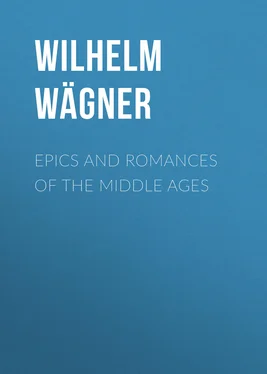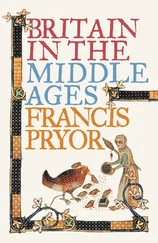Wilhelm Wägner - Epics and Romances of the Middle Ages
Здесь есть возможность читать онлайн «Wilhelm Wägner - Epics and Romances of the Middle Ages» — ознакомительный отрывок электронной книги совершенно бесплатно, а после прочтения отрывка купить полную версию. В некоторых случаях можно слушать аудио, скачать через торрент в формате fb2 и присутствует краткое содержание. Жанр: foreign_poetry, literature_19, Мифы. Легенды. Эпос, Поэзия, foreign_antique, foreign_prose, на английском языке. Описание произведения, (предисловие) а так же отзывы посетителей доступны на портале библиотеки ЛибКат.
- Название:Epics and Romances of the Middle Ages
- Автор:
- Жанр:
- Год:неизвестен
- ISBN:нет данных
- Рейтинг книги:4 / 5. Голосов: 1
-
Избранное:Добавить в избранное
- Отзывы:
-
Ваша оценка:
- 80
- 1
- 2
- 3
- 4
- 5
Epics and Romances of the Middle Ages: краткое содержание, описание и аннотация
Предлагаем к чтению аннотацию, описание, краткое содержание или предисловие (зависит от того, что написал сам автор книги «Epics and Romances of the Middle Ages»). Если вы не нашли необходимую информацию о книге — напишите в комментариях, мы постараемся отыскать её.
Epics and Romances of the Middle Ages — читать онлайн ознакомительный отрывок
Ниже представлен текст книги, разбитый по страницам. Система сохранения места последней прочитанной страницы, позволяет с удобством читать онлайн бесплатно книгу «Epics and Romances of the Middle Ages», без необходимости каждый раз заново искать на чём Вы остановились. Поставьте закладку, и сможете в любой момент перейти на страницу, на которой закончили чтение.
Интервал:
Закладка:
It was a song about all the little birds, and the music each made after its kind, sweet as a summer day, and all in honour of Alberich, king of the wood.
“Alberich—king of the wood,” Ortnit was sure that he had once heard more about him than that, but what it was he could not tell. Had he not played with a child of that name once? As he was puzzling over these confused memories of the past, he happened to glance at his mother’s ring; the stone in it was shining like a fire, and lighting up the face of a lovely child, who lay asleep in the grass close by.
“Poor boy,” said the royal hero, compassionately, “I wonder who brought you to this lonely place! How anxious your mother must be about you! I cannot leave you here to die of hunger or fall a defenceless prey to the wild beasts.”
He had already fastened his horse to a branch, and stooping down, he lifted the boy in his arms to carry him away; but to his intense surprise he received such a blow on the chest that he not only let the child fall, but himself tumbled on his back. He had scarcely recovered his footing, when he found the child holding him so tight that he had to exert all his strength not to be overthrown. It was a strange sight to see the tall king and the wonderful child, wrestling furiously together. Flowers and grass were trodden under foot, shrubs and low bushes broken and torn, when Ortnit at last flung his opponent on the ground, and drew his sword to slay him. But, angry as he was, he could not do it when the little thing gazed at him so entreatingly, and begged in such a sweet soft voice that he would not murder him when he was defenceless, but would accept, in exchange for the life he granted him, a valuable suit of armour, consisting of helmet, shield, and coat of mail of wrought gold and silver, and last not least, the sword called Rosen, whose blade had been rendered strong and durable in dragon’s blood. When Ortnit demanded a hostage for his opponent’s good faith, the little creature told him that hostages were impossible to find in that wild mountain country, but Ortnit might trust to his word, for he also was a king, and ruled over a far wider domain than Lombardy, though truly his realm lay beneath the earth instead of upon it, and his subjects were employed day and night in working in metals. Finding that no hostage was necessary, or indeed procurable, the hero allowed his prisoner to get up. But before the latter went to get the armour he had promised, he said that he would like to have the ring Ortnit was wearing, and that he scrupled the less to ask for it, as it did not appear to be of great value.
“I cannot give it to you,” replied Ortnit, “for it was a present from my dear mother, who would never forgive me if I parted with it.”
“And you call yourself a hero,” sneered the little creature, “ you who fear your mother’s blows! Tell me, what do you do when you are wounded in battle? Do you cry like a baby when you see the blood flow?”
“If you were to hew me in pieces,” replied the Lombard, “painful as that would be, it would hurt me less than a tear or a sigh from my mother.”
“Well, good squire of dames,” continued the other, “it can at any rate do the ring no harm for me to look at it and touch it. I am in your power, am I not? Your sword is in your hand, and I am without a weapon.”
After a little hesitation the king consented to let the boy draw the ring from his finger; but scarcely was this done, when he vanished from before his eyes, suddenly and without warning. Ortnit felt bewildered. He heard the boy’s voice, now at a distance and now near, making sarcastic remarks on the beating his mother would give him when he went home, and finally announcing that he would pelt him with a few pebbles to show him how well he could do it. Ortnit defended himself for some time against the terrible storm of sharp stones that rained upon him, but at last, seeing that neither his great strength nor his sword were of any avail, he turned to his horse and prepared to ride away.
On perceiving this the hobgoblin exclaimed: “Wait a bit, friend Goodman. I am sorry to think of the stripes your mother will give you. Listen to me. I have many important things to talk to you about. If you will give me your royal word of honour that you will not revenge yourself for the trick I played you, I will give you back your ring.”
“Very well,” answered Ortnit, “I promise on my honour.”
“And if I go on to talk ill of your mother?”
“No,” cried the king, “I will never forgive that. You may say what you like about me, but my mother is the purest and most perfect of women.”
“I quite agree with you,” said the little creature; “you may listen to me without fearing that I shall slander her, for I am Alberich (Ælf-ric) king of the Dwarfs, and you and I are more nearly related than you think. I will tell you the truth; but first take back your ring. I trust to your word of honour.”
The moment Ortnit felt the ring in his hand, he slipped it back on his finger, and immediately saw the boy standing before him.
“You must know, great king,” pursued Alberich, “that you have to thank me for your land and people, castles, towns and victories, and also for your marvellous strength. Your predecessor, whom you call father, married, when he was an elderly man, the youthful sister of the prince of the wild Reussen. The marriage was childless. Husband and wife in vain prayed heaven for an heir. Your mother was the best and most virtuous woman in Lombardy, but she wore herself away with fretting about what would become of the country and herself when her husband died without an heir. She foresaw that the nation would be split into factions, that civil war would desolate the land, and that she herself might be chased from Lombardy, a homeless exile. I often heard her plaints when I entered her room unseen. The older the king grew, the more her anxiety increased; then—well, you must know it sooner or later—I became her second husband.”
“Monster, you lie!” shouted Ortnit, drawing a dagger from his side, but he could not use it, for the smiling boy looked up at him so fearlessly.
“Your anger is bootless,” he said. “You had better let me finish my story. Young as I look, I am five hundred years old; small as I am, and big and strong as you are, I am yet your father. I proposed to the king that he should secretly get a divorce from his wife and let her marry me. He consented, but she would not. She refused. She spent days and months in weeping, and only gave way at last when her husband insisted! She and I were married secretly by a priest. No one guessed what had happened, and when you were born you were supposed to be the old king’s son. I did not win my wife’s heart, however, until her first husband was dead. After that I used sometimes to bring her here; you and I played together among the flowers like two children, and I sang with the birds that wild song of theirs about the king of the wood, which your mother often sung to you again at Castle Garden. When you grew to be a man and a hero, I was often at your side unseen, while the battle raged all round you, and on those occasions I have often turned aside the point of some murderous weapon that threatened your life. When you cross the wild ocean, and strive to win the Moorish maiden for your wife, I will be there to help you. So long as you wear that ring on your finger, you have only to wish for me and you will see me. Now wait a few minutes; I am going to fetch the armour that no weapon can pierce, and the sword Rosen, which can cut through steel and iron, and even dragon’s scales.”
Ortnit felt as though in a dream. While he was still thinking over all that he had just heard, the sound of heavy steps, and the clanking of armour startled him out of his reverie. Turning round he saw Alberich, who with the help of a sturdy dwarf was bringing his promised gift. On the top of the silver helmet with gold enwrought, was a priceless diamond. The whole suit of mail was of marvellously beautiful workmanship, and sparkled with gems wherever gems should be. The sword was in a golden sheath, its handle was a shining carbuncle, and on the sharp steel blade were golden figures and the letters forming the king’s name.
Читать дальшеИнтервал:
Закладка:
Похожие книги на «Epics and Romances of the Middle Ages»
Представляем Вашему вниманию похожие книги на «Epics and Romances of the Middle Ages» списком для выбора. Мы отобрали схожую по названию и смыслу литературу в надежде предоставить читателям больше вариантов отыскать новые, интересные, ещё непрочитанные произведения.
Обсуждение, отзывы о книге «Epics and Romances of the Middle Ages» и просто собственные мнения читателей. Оставьте ваши комментарии, напишите, что Вы думаете о произведении, его смысле или главных героях. Укажите что конкретно понравилось, а что нет, и почему Вы так считаете.










